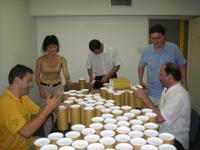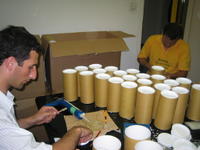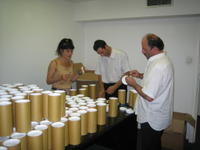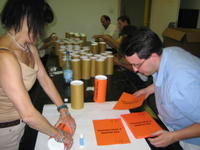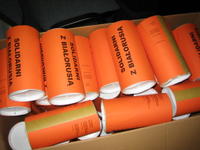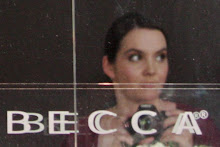Tolerance Education, or should that be Education promoting Respect and Diversity?
I went to my last side event at the OSCE HDIM yesterday. It was run by the OIDHR Tolerance and Non-Discrimination Programme and involved a number of very interesting speakers.
The panel was made up of Stacy Burdett from the
Anti Defamation League, Jolanta Ambrosewicz from the University of Krakow and Majella o'Shea fom the
National Council for Curriculum and Assessment in Ireland.
Again, I don't want to regurgitate the presentations and discussions, but rather highlight some points that made me think.
First, a bit of background. The Anti Defamation League has a '
World of Difference' Institute which '
provide hands-on training to help children and adults challenge prejudice and discrimination and learn to live and work successfully and civilly in an increasingly diverse world.' This was described in some detail and sounded a very promising way of raising awareness in children and adults about prejudice and intolerance. It also aims to teach skills to those involved to change them from passive bystanders to activists, directly challenging prejudicial atitudes and helping to change them. There are also many publications that are widely distributed in the USA.
Ireland's Council for Curriculum and Assessment has also been very active in raising awareness about the need for intercultural education. Their most recent publication aims to enable children to respect and celebrate diversity, to promote equality, and to challenge unfair discrimination. It's fascinating and I'd encourage as many people to read it as possible.
Some major issues and challenges were raised:
- If you can teach a child to be secure with his or her identity and develop self-confidence he or she will feel no need to denigrate others.
- School is a place where children start to learn about social systems and behaviour. If we can teach respect for diversity at an early age, this should lead to intolerance of prejudice further along the line.
- When introducing such concepts into schools they are not always welcomed. Teachers are not always comfortable tackling issues such as racism so guidelines should always be accompanied by training to give teachers the necessary skills.
- Other influences that potentially contradict education promoting respect and diversity may come from the children's families. This is a very tricky area because in general awareness raising aimed at parents results in 'preaching to the converted', only those who are already open to such concepts attend the sessions. It was suggested that the channel through which this could be successfully challenged might be the media rather than schools.
- To go from paper to practice requires the concepts involved to be inbedded into curricula and schools to be actively engaged.
- The terminology involved is also a sensitive area. People often talk of 'tolerance education' but this has a passive, almost negative quality to it. We all try to be tolerant people but I suspect minorities want more than to just be 'tolerated'. Active words such as respect convey a much clearer picture of what is involved in intercultural education.
A recurring theme in matters as abstract as 'tolerance' and 'respect' is the need for quantification. How can we assess the effectiveness of education promoting respect and diversity? Is it simply a matter of looking for reductions in hate crimes, or can we find a more positive indicator? Do we need to find an indicator at all? Or is it simply such an obviously good thing that we try to spread its availability regardless?
Inter-Religious Dialogue vs. Hate Crimes
It is repeated again and again that the way to tackle hate crimes, and intolerance and discrimination in general, is through raising awareness, facilitating opportunities for dialogue and the proper integration of minorities.
Today I attended a side event at the
OSCE HDIM run by
Century 21 outlining the actions they are taking in Georgia to try and reduce the number of religiously motivated hate crimes.
Century 21 is an NGO set up to contribute to the development of the country and runs several programmes covering several human rights dimensions: democracy and the rule of law; youth and children; consumers' rights and tolerance promotion.
One central initiative this group is taking to address the problem of religiously-motivated hate crimes is a youth network against discrimination and intolerance. The network stems from the idea that young people are society's leaders of the future and are the most vulnerable to the devastating effects of violence and intolerance. The 120 members of the network represent all of Georgia's religious groups and also represent ethnic and sexual minorities. The young people involved in the network will be used as contact points for the collection and analysis of hate crime data, which should in turn allow NGOs such as Century 21 to tackle the problem directly.
I think it's a great initiative and one which is intended to spread to other countries, starting with other ex-Soviet states. Let's hope similar initiatives are introduced all over.
Is the return of trafficked victims always safe?
Today’s side event was on the return of trafficked victims. I was keen to attend as the International Federation of Terre des Hommes is very actively campaigning against child trafficking and I got to attend a lot of related discussions during my IFTDH internship in Brussels. I’m not going to give a detailed description of the discussion because I think it would be a lot more interesting, and hopefully thought provoking, if I just outline the main points that struck me.
There was a great panel of speakers: An NGO representative from Moldova, a lawyer from Switzerland, a representative of the Poppy Project in the UK and a representative from La Strada Poland.
The discussion was led by members of the OSCE’s ODIHR’s Human Rights department and was based on the worrying fact that indicators show not only that returns of trafficked victims are increasing, but that these returns are not usually accompanied by a proper risk assessment of the situation when they arrive at their country of origin. Coupled with the EU’s proposals for harmonising the return of ‘illegal migrants’, a term which if broadly used includes those who have been trafficked, there are serious questions about what is happening to many trafficked victims.
A few points that struck me:
- 650,000 ‘illegal migrants’ were returned to their countries of origin last year from the European Union. How many were victims of trafficking and how many of those victims were subject to forced returns, back to the conditions from which they were trafficked in the first place is unknown.
- A risk assessment is vital to determine whether a victim may be returned to her country of origin (the discussion focused on women who are trafficked). Serious questions remain about who should carry out the risk assessment but it is generally thought a collaborative effort between law enforcement authorities and NGOs result in the most realistic picture. Where the information should come from is another vital consideration. Authorities, and even NGOs are often keen to stress the services that are available to trafficked victims and underplay the risks they may encounter. Once again collaboration is the keyword, enabling a realistic picture of the situation to emerge.
- A central problem in the case of Poland, but also in other countries, is the lack of identification of trafficked people. It was argued that this is not due to the lack of knowledge of trafficking or measures with which it can be identified, but instead due to the lack of political will and the generally negative perception of migrants.
- This leads on to the fact that even in countries where good laws exist relating to the fight against trafficking, if there is no general awareness about the issue, or law enforcement officials are not trained to identify victims of trafficking the laws are not enforced and have no impact on the problem.
- Trafficking cases are often treated in a similar way to asylum claims. The country of origin is looked at in general terms and not with particular reference to the case, which misses the point. A woman from a ‘safe’ country may not be safe if returned there, to the criminal gangs who trafficked her in the first place, to the same situation which may have led her to desperate measures to make money, and this time with the added trauma of what she experienced when she was trafficked.
- A related point is that the burden of proof lies very heavily with the victim of trafficking. She must prove she is at risk in her country of origin. But how should she, or her lawyers, find this proof without putting themselves in danger? And what if she has no access to a lawyer?
- There is a serious gap in the campaign to stop trafficking. There are wide international programmes, and there are small NGOs taking up individual cases, but the cooperation and coordination needed for longer-term solutions to the problem are often simply not there. Added to this is the fact that trafficking networks are enormous and complex.
- States in general are obsessed with the worry that if provisions are made for such victims, they are open to abuse of the system and will be taken advantage of. In actual fact, such worries tend to be proved ill founded.
One example from Switzerland really illustrated the appalling experiences trafficked victims often suffer and the lack of understanding countries of destination can show when regarding their cases:
- A 16 year-old Brazilian girl was trafficked to Switzerland and made to work in a brothel. After two years she escaped and with the help of an NGO was able to compile a criminal case against her traffickers. The girl’s mother came from Brazil and gave evidence in court, saying there were other minors who were used in the brothel. The court, once the case was closed, said that the girl was now free to return to Brazil. Her lawyers protested that her return would not be safe as a result of the trial, that she was at risk of being murdered and appealed the decision. The mother, who had testified, returned to Brazil and was herself killed by the brother of the accused man. The appeals continued until they reached the highest court in Switzerland. Only then, when the highest court referred back to the court of first instance was a permit granted for the girl to stay.
If you, as someone who has been forced into the sex trade and been subjected to all sorts of violence and inhumane treatment cannot be granted the right to stay in a safe country until a member of your family is killed, well, what is there left to say?
Lives on Hold: The Human Cost of Statelessness
The OSCE’s current Human Dimension Implementation Meeting has a huge number of side events. Today I attended one by Refugees International: ‘Lives on Hold: The Human Cost of Statelessness.’
Statelessness is an issue of which I was relatively ignorant. Maureen Lynch gave a fascinating presentation of the work Refugees International have been doing in this area and distributed a copy of the organisation’s recent report on statelessness around the world.
A bit of background: There are many declarations and international agreements underlining the right to a nationality (the UN Declaration of Human Rights for one, as well as several less well-known agreements). However, despite these international commitments there are many countries with staggering numbers of people who don’t have that right.
Being without nationality means being without security. Without this right, people start losing other rights, employment rights, healthcare rights, social security rights. But how do people find themselves in such positions? Maureen Lynch outlined some of the main reasons: Political change; targeted discrimination; differences in the laws between countries; transfer of territory; law relating to marriage and birth registration; expulsion of people from a territory; nationality based solely on descent; renunciation of nationality without acquisition of another; lack of financial ability to register children.
Examples were given from an assessment mission that was undertaken last November:
- In Bangladesh 250,000 Biharis live in crowded camps near the Pakistani border. Pakistan and Bangladesh both refuse to offer them citizenship and nothing has been done for 34 years to change their fate.
- In the United Arab Emirates 100,000 Bidoon live in shantytowns and are subjected to widespread discrimination which affects their rights to education, employment and healthcare.
- In Estonia 150,000 Russian-speaking minority residents are not allowed citizenship without developing Estonian language skills to pass a citizenship test. There have however been signs that the government is willing to make concessions in some cases and steps are being made in the right direction.
It’s a vast problem. The low conservative estimate by Refugees International suggests over 11 million people are stateless. The problem is such that it is not restricted to one area of the world, and responsibility lies with individual governments, as well as the international community and United Nations to address the issue and find long-term solutions.
Refugees International has helped to bring the issue of statelessness onto the political agenda in the USA as well as in Europe. Positions have been created to focus on this issue, and high level discussions have been held. There is a full list of recommendations to governments, UN and NGOs in the report which can be downloaded from the Refugees International website.
Standstill Moment
Last night the Association for Asylum Seekers and Refugees performed a play to the OSCE Human Dimension Implementation Meeting.
It was different from our last performance in May because rather than following a linear storyline it's a play based on a poem and involving several scenes featuring dancing, music and languages from around the world.
A mixed-bag summit
This is an interesting article on last week's
UN conference.
Italian treatment of refugees in breach of human rights, say MEPs
Another sad example of refugee detention centres,
this time in Italy.
My presentation from today...
This is the text of the presentation I made at the OSCE's annual Human Dimension Implementation Meeting today. Yeah, it went ok...
Introduction:
EVS project
Good afternoon, my name’s Rebecca. I’m in the middle of a European Voluntary Service project, and part of my time is spent with the Refugee Association.
Why the association?
I was interested in working with the association in order to get practical experience working with human rights issues. I have theoretical knowledge and some work experience in large organisations but I wanted to experience working with a small grassroots organisation such as the association.
Role within organisation
I work with other volunteers to support the work of the association, contributing to the magazine ‘Voice of Exile’, helping to prepare cultural events (such as ‘Standstill Moment’ which will be performed here in a couple of days) and ongoing activities in the association such as identifying possible funding opportunities and taking part in conferences such as this one.
Current situation:
As Zuu pointed out, the association is the only one at grassroots level run by and for refugees. Asylum seekers and refugees come to the association for help with many areas of their lives and I’m going to talk about the main areas in which the association is active.
First I will talk a bit about hate crimes, a topic the OSCE is very much focused on, then I will go on to the type of activities the association organises, finishing with the monitoring, which is part of the association’s day-to-day work.
Hate Crimes
The association is often the first place to which asylum seekers and refugees come following an attack. A number of hate crimes have been reported to the association in the four months I have been in Warsaw and I’d like to mention a few to illustrate the kinds of crimes we are talking about:
KFC – A Cameroonian refugee was attacked while queuing for food on a Saturday evening. The fast-food restaurant was packed and nobody, security guards included, intervened to stop the attack. It was unprovoked and vicious, consisting in a verbal and physical attack that left the refugee with a head injury.
Siekirki break-in and stabbing – A Polish man broke into the Siekirki refugee centre late at night and stabbed an asylum seeker from Ingushetia. The police were called and the man held down by other residents of the centre, but the police failed to arrive. Only when residents of the centre called Zuu, the president of the refugee association, and he called the police again, did they arrive.
Pizza Hut – Another Saturday night, a group of African footballers were leaving the Pizza Hut adjacent to the KFC in which the Cameroonian refugee was attacked. As they left, they were attacked from behind by people wielding chairs that had been stacked by the exit. They needed hospital attention but decided not to contact the police
Other hate crimes that have been reported to the association include verbal and physical attacks on buses and in the street.
Many of the people who are affected by such crimes contact the association before, or instead of, the police, which indicates a certain lack of trust in the effectiveness of the authorities. The association does advise all people suffering such crimes to report them to police and also to keep medical documents relating to the injuries sustained as a result, but many feel there is little point as refugees and asylum seekers are low on the list of police priorities.
Integration activities
As well as monitoring the bad experiences that asylum seekers and refugees face in Warsaw, the association also tries to encourage good experiences.
The association regularly takes part in education and integration activities. I’ll give you a few examples of some of the activities that I have witnessed.
Cultural Events – At the last OSCE conference, here in May, asylum seekers and refugees from the association, as well as a couple of volunteers like me, performed a play: ‘Journeys in a New Homeland’. It’s the story of a woman who flees her war torn homeland in Africa and comes to Europe. As well as giving the asylum seekers and refugees a chance to earn some money at the same time as being creative, the play aims to raise awareness about the kinds of situations asylum seekers are fleeing, and the kinds of difficulties they may face when arriving at their destination. At the moment we are looking for funding to allow the play to tour around Poland and reach the wider Polish public. The association has organised a number of performances, including dancing, music, theatre, story-telling and poetry. These activities encourage refugees to rediscover their culture and share it with their host society.
Integration activities – A recent example of an integration activity is the football match that was held between a Polish team (Ballaton) and a team made of players from various African countries. The association considers that this contact between Polish people and refugees in a popular area such as sport, will go some way to help changing prejudiced attitudes.
Educational activities – This summer Zuu led an integration class of young Poles who are currently out of work. He has also taught an English class at a community centre in Żoliborż for the past two years. Just last week the association finally opened the doors to their second office in ul. Oleandrów, which will be an integration centre running language courses, offering free information and holding a range of activities.
A couple of months ago, we also hosted a debate following an article in a popular newsmagazine entitled “Black women in Africa are not human beings”. The debate was aimed at raising awareness about the complexities of the situation in many African countries and to warn against these types of sensationalist statements that paint a one-dimensional and false picture of the continent of Africa.
Monitoring
I already mentioned the monitoring of hate crimes, but the association monitors more than this.
Any individual who comes to the association for help leaves comprehensive contact details to enable easy follow-up;
Publications by other NGOs, governmental organisations and other authorities working with asylum seekers and refugees are systematically monitored to ensure they are abiding by international human rights standards;
If anything is highlighted that seems to contradict human rights standards, the information is scrutinised and a meeting is organised with the relevant authority. For example, a website quoted the Director General of the Office for Repatriation and Aliens Mr. Jan Węgrzen as saying the only refugees who should be accepted into Poland are those from Slavic countries as they tend to integrate more easily. We arranged a meeting with Mr. Węgrzen and challenged him with what he was quoted as saying. He explained that his comments had been directed at Slavic workers, not those seeking asylum. He wanted such individuals to be invited to Poland to live and work.
Conclusion:
Hate Crimes: The association is shocked every time someone comes to us with another report of a hate crime. We will continue to monitor the situation and keeps records of each event, but we hope that we can also contribute to a change in societal attitudes, which would hopefully reduce the number of these terrible crimes.
Integration activities: The integration and education activities that we organise will continue as long as we can find the sponsors and willing participants. Polish society does not yet accept asylum seekers and refugees and we will do as much as possible to change attitudes for the better and show everyone the value refugees can bring to a society.
Monitoring: The monitoring of hate crimes, the services that are required by asylum seekers and refugees and the position of organisations working in this area is vital for the protection of human rights. We are determined to continue this work and continue to build bridges with other organisations working in this area.
As with every small NGO, one of our biggest challenges is finding the funding to continue our everyday work. We are currently facing a bit of a financial crisis and if anyone is in a position to help, we would love to hear from you! Thank you.
Geneva
BBC's Radio 4 broadcast a great programme this morning about the 1951 UN conference which led to the Geneva Convention on refugees. You can listen to it again
here.
UNDP
The UNDP's
Human Development Report has been released, for those of you who want to read a report which 'highlights the human costs of missed targets and broken promises'.
Bush gets it wrong again...
When talking about the people displaced by Hurricane Katrina this month President Bush reportedly said "The people we're talking about are not refugees," he said. "They are Americans and they need the help and love and compassion of our fellow citizens."
I see this as is an extremely bizarre (or maybe just mindless, stupid, damaging, typical) thing for him to say. It implies that the term refugee only applies to people from countries outside of America. If you are American, you cannot be a refugee? I would say a refugee is a person from any country who flees their home to seek refuge. Thousands of people from New Orleans have done just that. Rev. Jesse Jackson has gone even further, saying that the term 'refugee' is racist and implies the people termed in this way are second-class citizens, not American. Excuse me? No, really, what? All this demonstrates to me is the negative way in which refugees are portrayed has meant that the term (at least in the States) is not used in the way it should. These people are refugees, just as people fleeing other natural or man-made disasters are refugees. They deserve Bush's 'help, love and compassion' just as much as other refugees do.
EU immigration proposals
Information on new European Commission proposals to combat illegal immigration and return failed asylum seekers
here and
here.
If I ruled the world...

I might be oversimplifying slightly here, but to me the world is like this: Nobody chooses which parents to be born to, so nobody chooses which country to born into either. There is no person in charge dividing up the people into good and bad, rich and poor, those who deserve a prosperous nation, those who deserve chaos and starvation. Therefore if something happens in 'your' country which you don't like (let's say war, or famine, but also persecution or lack of economic opportunity) and you wish to find a better life for yourself and your family, I say go for it. I say countries with better positions have a duty to cater for those from deprived areas. History, geography, such a wide range of factors contribute to the situation of countries in the world today that I simply don't understand those who say 'don't come here, we only have enough for ourselves, never mind that you have suffered, you're not our problem.'
When people in Europe are heard saying that Europeans have any number of their own problems, I am sympathetic. But I cannot see how this leads to 'so why should we accept refugees into our country?' Maybe because every human has certain rights that need to be respected. Maybe because there are some situations that are so awful that many ways of life that are 'sub-standard' to some Europeans would be seen as an improvement. Or maybe even because refugees can contribute to their new countries in valuable ways. Maybe because real integration can lead to enriched cultures and open-minded citizens. In general people don't want to leave their lives, their families, their friends, their jobs, their culture behind. Dreadful situations lead to drastic action. If they have to go, they have to go. Everyone who has taken such a choice deserves to be listened to and treated with respect.
Lack of respect upsets me, but exploitation and money-grabbing makes my blood boil. To be told that people working within certain structures processing refugee applications take a significant amount of money from these desperate people in exchange for fast-tracking and assuring them a political status maybe shouldn't come as a surprise, but it does.
It surprises me and shocks me, and if I ruled the world it just wouldn't happen.

